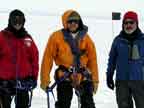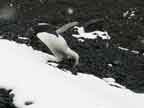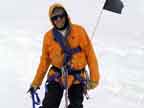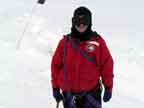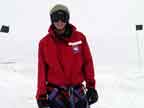Aaron writes from McMurdo:
We arrived in McMurdo 21 days ago, and have been very busy organizing the necessary equipment and provisions to sustain us in the field for about four weeks. Our training and preparations have served as a wonderful introduction to just about every tool and skill one could think of using for the field, far beyond my initial expectations that this would be a strictly geological experience. Whether it is banding pallet loads, driving 'Mattracks,' repairing snowmobile engines, operating differential Trimble GPS systems, or learning how to rescue fallen crevasse victims, we have had some introductory level of training. We now realize the breadth of knowledge required to function in the deep field and obtain the raw scientific data is absolutely amazing.
When not packing or attending some training session, our time has been spent making use of the 24 hours of sunlight. We seemed to have all found our individual niches here -- for me that might entail going for runs out to the sea ice, up to the 'golf ball,' or up to Ob Hill to pay respects to Scott and his ill-fated partners. It is truly amazing to peer out at such an expansive landscape, and to have history that seemed fictional become real. To imagine what our predecessors endured for our being able to study this magnificent continent is harrowing and inspiring at the same time.
Other than exploration, we have all enjoyed the various thrills available here. Dr. Ackert and I, for instance, took part in the 'Polar Plunge' at the New Zealand Scott Base, where we each earned our patches by diving into 28°F water wearing nothing but safety harnesses. It was bloody cold, perhaps preparing us for everyday life in the Ohio Range. The next day, Dr. Mukhopadhyay and I, the Antarctic rookies of the group, were also fortunate enough to be approached by a couple of curious Adelie penguins on a terrestrial deep field expedition of their own! As a protected species, it is illegal to approach penguins or disturb them in anyway, so to see them close up is indeed fortunate.
All in all, the experience has so far been rounded and full of surprises - and the expedition has only begun. Tomorrow morning we depart for South Pole station, where we will quickly transfer our gear and food into four Twin Otter loads, and hopefully be flown to the Ohio Range that day. From then on, the expedition I am guessing will change gears into an entirely new set of experiences -- and I think we are all ready and excited for the change.

